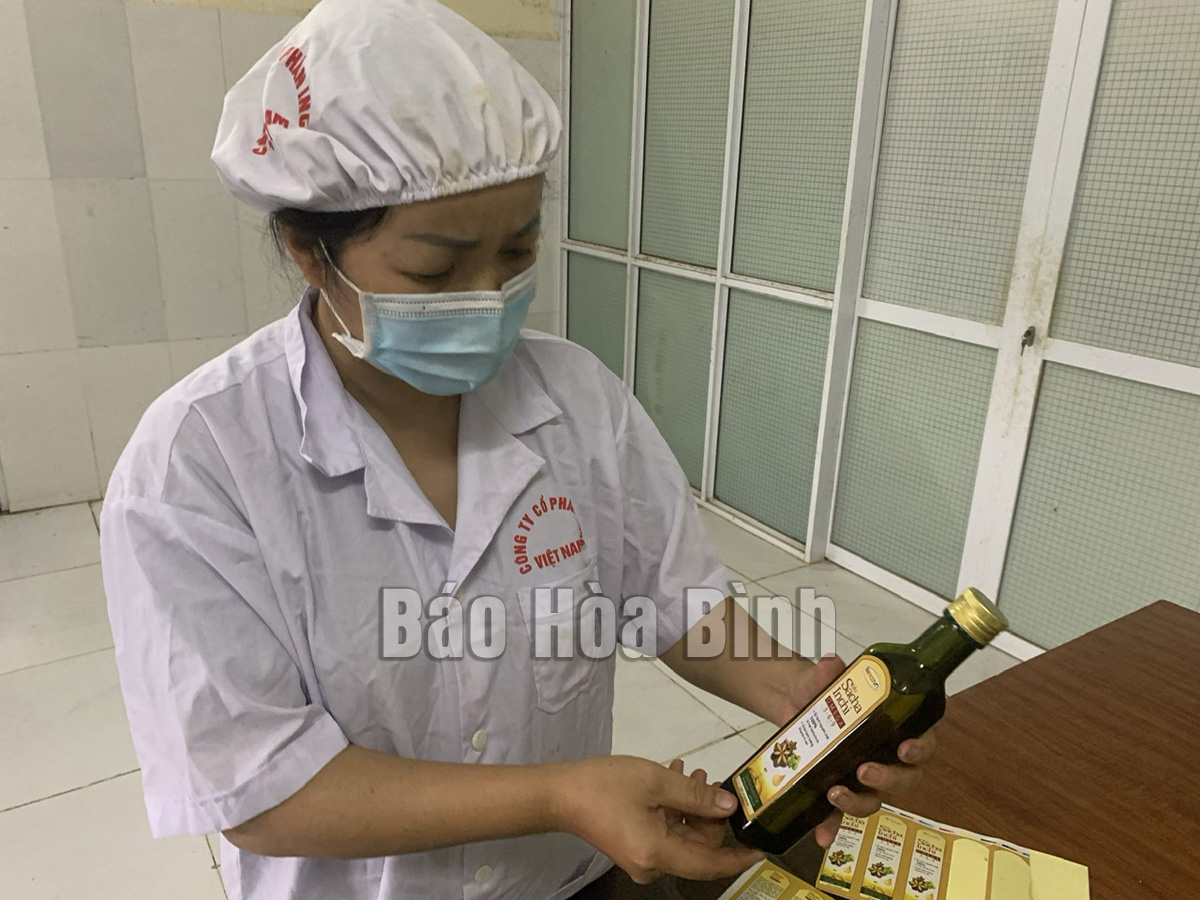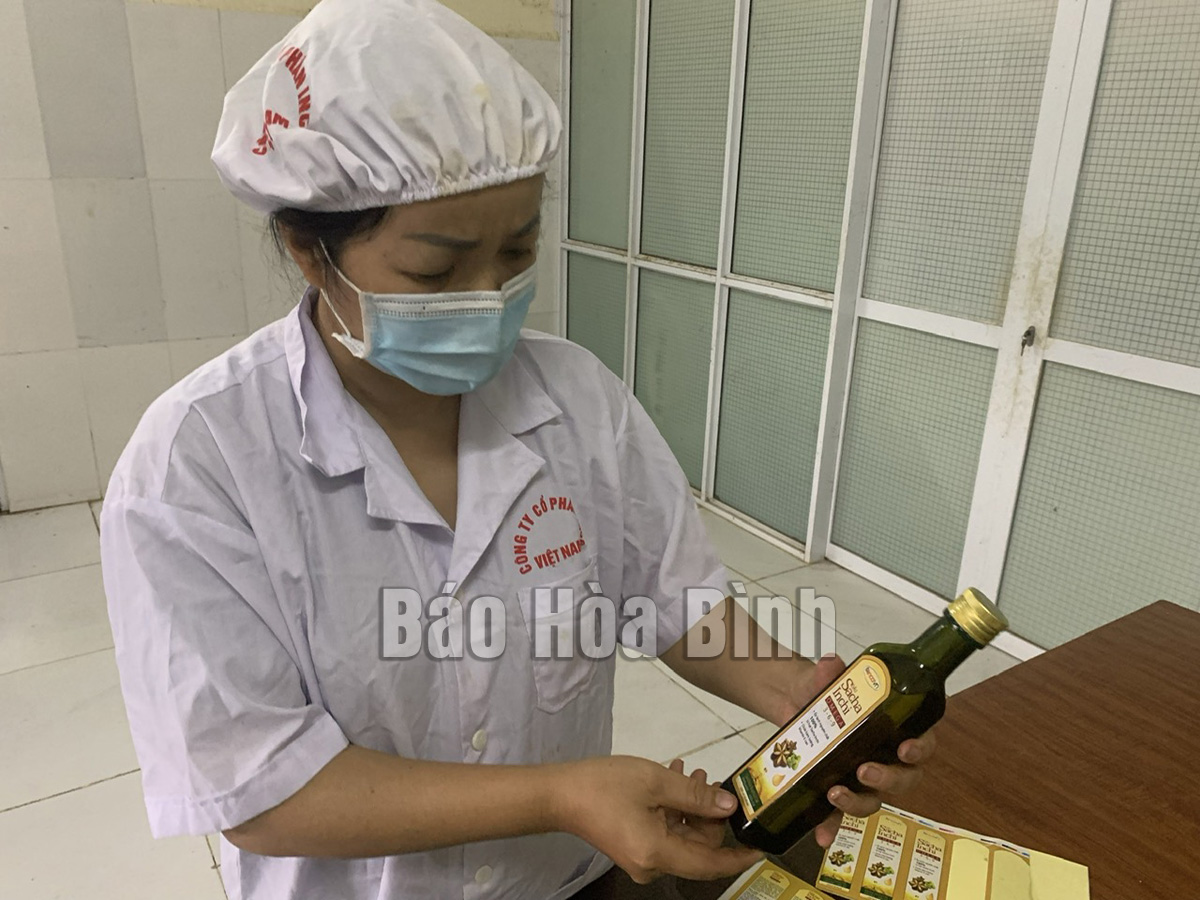
(HBO) – After over four years implementing the One Commune One Product (OCOP) programme, Hoa Binh city now has three 11 products awarded 3-star recognition and seven others achieving 4-star certification. This year, the locality aims to develop 10 more 3-star OCOP products and elevate one existing 3-star product to a 4-star level.

The Inca Inchi essential oil product receives support in terms of
packaging and design when joining the development of the 3-star OCOP products.
At
present, the city's OCOP products mainly fall into the categories of processed
food, herbal medicine, and beverages. Many of the 4-star OCOP products involve
the deep processing of local specialties, such as the trio of products made
from black carp, golden snakehead fish, and black lang fish from Hai Dang
Seafood Company, the Ca gai leo tea and Shan Tuyet tea from Pa Co, the Inca
Inchi tea, and various Inca Inchi oils and lemongrass essential oils.
Nguyen
Van Tuan, deputy head of Hoa Binh city's economic office, said since the OCOP
programme was launched, the city has been proactive in supporting and
diversifying promotional activities. These activities include organising
seminars, conferences, trips and knowledge-sharing sessions to raise awareness
among businesses, organisations and individuals involved in the programme.
Resources
have also been allocated to support the completion of certification procedures
for OCOP products and to popularise these products to consumers.
This
year, the city plans to develop 10 new 3-star OCOP products, including Muong
ethnic leaf yeast, leaf yeast rice liquor by Vuong Thi Hang business household
in Trung Minh ward; salted chicken, smoked chicken, and salted chicken legs by
Tay Bac Foods JSC in Yen Mong commune; the "dinh lang" wine by Duong Thi
Huong business household; Thuy Bach incense and Nham Thuy Bach massage oil by
Bach Viet Cooperative in Dan Chu ward; Dao ethnic honey by Dao Agricultural
Cooperative in Thong Nhat ward; Cuu Vi tea by Huna's Home Herbal Company in Tan
Hoa ward; and lemongrass lime essential oil by Dao Agricultural Cooperative in
Thong Nhat ward.
Tuan added that the city is helping entities
finalise the evaluation of OCOP product quality while promoting trade and
product consumption to expand the market and improve the value of local OCOP
products./.
According to data from the Hoa Binh Provincial Party Committee, the industrial production index for the first six months of 2025 is estimated to have increased by 20% compared to the same period last year. This marks the highest year-on-year growth rate for this period since 2020.
In the first six months of 2025, Hoa Binh province’s export turnover was estimated at 1.145 billion USD, marking an 18.11% increase compared to the same period in 2024. Import turnover was estimated at $ 804 million, a 17.15% increase, which helped the province maintain a positive trade balance.
The lives of the ethnic minority farmers in Tan Lac district have gradually improved thanks to the new directions in agricultural production. This is a testament to the collective strength fostered through the professional associations and groups implemented by various levels of the district’s Farmers’ Union.
With the motto the "product quality comes first,” after nearly one year of establishment and operation, Muong village’s Clean Food Agricultural and Commercial Cooperative, located in Cau Hamlet, Hung Son Commune (Kim Boi district), has launched reputable, high-quality agricultural products to the market that are well-received by consumers. The products such as Muong village’s pork sausage, salt-cured chicken, and salt-cured pork hocks have gradually carved out a place in the market and they are on the path to obtaining the OCOP certification.
In the past, the phrase "bumper harvest, rock-bottom prices" was a familiar refrain for Vietnamese farmers engaged in fragmented, small-scale agriculture. But today, a new spirit is emerging across rural areas of Hoa Binh province - one of collaboration, organisation, and collective economic models that provide a stable foundation for production.
Maintaining growing area codes and packing facility codes in accordance with regulations is a mandatory requirement for agricultural products to be eligible for export. Recently, the Department of Agriculture and Environment of Hoa Binh province has intensified technical supervision of designated farming areas and packing facilities to safeguard the "green passport" that enables its products to access international markets.



